MARKET OVERVIEW
The Quantum Dot and Quantum Dot Display Market is where cutting-edge technology converges with visual brilliance. At the heart of this market is the ingenious application of quantum dots, nanoscale semiconductor particles that possess unique electronic properties. These tiny wonders, often composed of materials like cadmium selenide or indium phosphide, have redefined the landscape of display technologies.
Quantum dots, when integrated into displays, bring forth a myriad of advantages that elevate visual experiences to unprecedented levels. Their ability to emit specific colors with exceptional precision enhances the color accuracy and vibrancy of displays, creating visuals that are not only captivating but also true to life. This breakthrough technology holds immense significance in the world of electronics, marking a paradigm shift in how we perceive and interact with visual content.
The importance of Quantum Dot and Quantum Dot Display Market becomes evident when considering their role in addressing longstanding challenges faced by traditional display technologies. One of the key advantages is the expanded color gamut, allowing for a broader spectrum of colors that goes beyond what conventional displays can achieve. This advancement has profound implications for industries where color accuracy is paramount, such as medical imaging, design, and content creation.
Moreover, the Quantum Dot Display Market is making significant strides in the realm of energy efficiency. The quantum dots' ability to precisely tune the emission of light leads to displays that are not only brighter but also more energy-efficient, a crucial aspect in today's eco-conscious world. This characteristic not only reduces the carbon footprint associated with electronic devices but also opens doors for innovative applications in portable electronics and emerging technologies.
In addition to their visual prowess, quantum dots hold promise in revolutionizing the field of quantum computing. Their quantum properties, such as superposition and entanglement, make them valuable candidates for quantum information processing. As the Quantum Dot and Quantum Dot Display Market continues to evolve, the synergy between quantum dots and computing technologies is likely to redefine the landscape of information processing and storage.
Global Quantum Dot and Quantum Dot Display market is estimated to reach $13,067.6 Million by 2030; growing at a CAGR of 19.9% from 2023 to 2030.
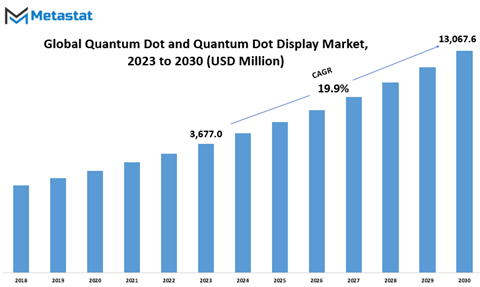
GROWTH FACTORS
The global Quantum Dot Display market growth is being driven by factors such as rising demand for better quality displays with purer colors, higher efficiency and improved brightness. Key growth drivers also include strong adoption across consumer devices like televisions, smartphones and tablets along with expansion into applications like digital signage and monitors.
However, the market faces challenges in the form of developing lower cost, higher yielding manufacturing techniques and expanding mass production capacities to serve wider industry needs. High prices compared to competing display technologies also remain a concern. Complying with various environmental regulations regarding material usage poses a potential hurdle too.
That said, attractive opportunities exist for the broader Quantum Dot Display ecosystem. These include new product segments like quantum dot enrichment films, quantum dot color filters and self-emitting QLED technologies currently in R&D. Printing-based mass production methods also show promise for improving affordability. Expanding implementation areas across automotive displays, VR headsets and others assure future growth potential. Additionally, tapping emerging markets with rising consumer classes offers expanded opportunities worldwide.
While pricing and capacity challenges persist in some areas, the overall industry outlook remains optimistic. Continued unique performance benefits, emerging applications and maturing manufacturing techniques predict a robust commercial runway for the vibrant colors and superior qualities of Quantum Dot Display innovations.
MARKET SEGMENTATION
By Type
Cadmium-based quantum dots have exhibited very high color quality and efficiency which enabled early Quantum Dot Display implementations. However, environmental and health concerns around the heavy metal restrict their wider adoption. Factors like strict government regulations, especially across Europe and North America, also limit long-term marketability.
In contrast, Cadmium-free or CFQD quantum dots using elements like Indium, Zinc and Selenium provide a safer, sustainable alternative. CFQDs deliver similarly high color performance meeting Quantum Dot Display needs without the toxicity concerns. Consequently, CFQD development has been an intense area of R&D by key industry participants to enable next-gen display innovations. While early CFQDs had endurance and stability issues, latest advancements have corrected these adequately while achieving purity levels acceptable for commercial displays.
Industry experts predict Cadmium-free Quantum Dots will represent over 75% of the global Quantum Dot Display materials market by 2027. With prominent TV brands such as Samsung, TCL, Vizio and others committing to CFQD models, market momentum continues shifting towards safer and eco-friendly quantum dot implementations throughout the broader display ecosystem.
By Product
The global Quantum Dot Display market caters to various product segments including smartphones, PC monitors, tablets and TVs.
Quantum Dot Enhancement Film adoption is rising rapidly across mid-to-high end smartphone models seeking to provide exceptional display quality and brightness without excessive battery drain. Major brands launching quantum dot enabled phones include Samsung, OnePlus, Xiaomi and Motorola.
PC monitors also represent an expanding product segment for quantum dot displays which aim to service gaming, professional design and content creation needs. Enthusiast model quantum dot gaming monitors from Dell, Acer and others highlight advanced local dimming capabilities, pure RGB color reproduction, high peak brightness and minimal motion blur.
While early traction came from the television space, the tablet PC category also offers growth potential as brands target professional applications requiring true color accuracy and vibrancy. Asus, Lenovo and Huawei have showcased quantum dot tablets tailored for designers, photographers and video editors through collaborative partnerships.
Industry projections predict strong unit shipment growth across all product categories as quantum dot components get further integrated into next-gen display implementations for delivering truly differentiated visual experiences centered on color, accuracy and realism.
By Application
The global Quantum Dot Display market serves various application areas including consumer electronics, healthcare, automotive and IT & telecommunication.
Consumer electronics represent the largest and fastest growing application segment currently. Quantum dots enable vibrant colors, pure black levels and exceptional contrast ratios demanded by high-end television and smartphone brands differentiating through display performance. Gaming monitors and premium tablets also integrate quantum dot films or components to serve enthusiasts.
In healthcare, quantum dots help enable superior medical displays capable of accurately rendering subtle tones and textures crucial for diagnostics. Quantum dots display assisted surgery platforms, endoscopy visualization tools and medical monitors offer lifelike detail.
Automotive space is an emerging segment where quantum dot displays provide ruggedized solutions meeting harsh environmental needs while showcasing vibrant imagery, improved sunlight visibility and low power requirements. Automakers are evaluating quantum dot implementations tailored to electric vehicles and next-gen cockpit designs focused on the passenger experience.
Quantum Dot Displays also serve specialized applications in areas like simulation, training, and mission-critical transport across aerospace, defense and industrial settings needing accurate color reproduction under diverse rugged operating conditions.
Overall industry efforts to expand quantum dot display utility into new domains beyond consumer entertainment promise to further fuel market expansion worldwide.
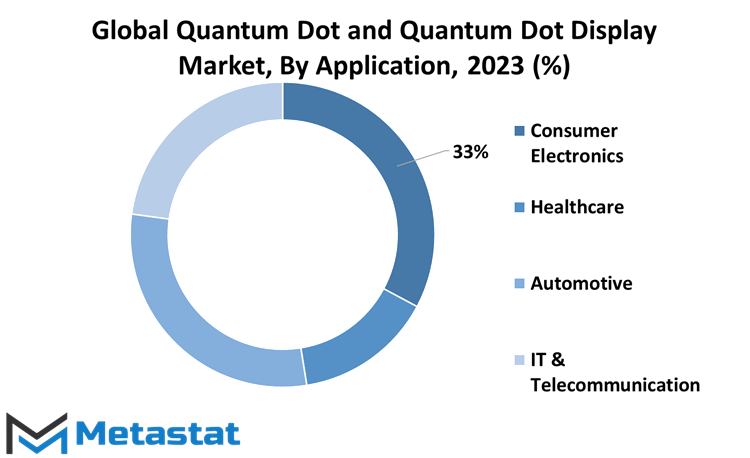
REGIONAL ANALYSIS
The global Quantum Dot and Quantum Dot Display market exhibits distinct trends across major geographic regions. This market consists of quantum dot materials, components, and devices used for various optical, optoelectronic, and display applications.
North America currently represents the largest share of the global Quantum Dot and Quantum Dot Display market. Early adoption of the technology by display manufacturers and strong demand from the consumer electronics sector drive market growth in this region. The presence of key quantum dot manufacturers also propels innovation.
Europe accounts for the second largest share globally. Expanding development of quantum dot solutions for lighting, photovoltaics, healthcare, and anti-counterfeit applications fosters market growth in this region. Government funding for nanotechnology research and a flourishing automotive sector support new product development.
The Asia Pacific region is anticipated to exhibit the fastest CAGR over the coming years. Rapid advancements in display technologies by China, South Korea, and Japan coupled with large-scale manufacturing capabilities characterize regional growth trends. Emerging applications in security printing, biomedicine, and energy also bolster demand.
While North America and Europe currently dominate, the quantum leaps in R&D and competitive manufacturing witnessed across the APAC augur well for the global Quantum Dot industry’s outlook through the decade. Overall, burgeoning implementations across LEDs, displays, photovoltaics, biosciences, and optics assure robust future expansion.
COMPETITIVE PLAYERS
The global Quantum Dot Display market is served by many established manufacturers and emerging players driving new innovations. Key companies operating in this industry include Nanoco Group plc, Nanosys Inc and others.
Nanoco Group is a pioneer in the development and large-scale production of heavy-metal free quantum dots. Its cadmium-free CFQD quantum dot materials deliver the high color quality and stability required in display applications. Nanoco continues to expand its production capacity and product portfolio for QD Displays while also extending its quantum dot capabilities into sensing, anti-counterfeiting and biological imaging markets.
Nanosys Inc has played an instrumental role in enabling QD Display adoption through its high-efficiency Quantum Dot Enhancement Films (QDEFTM). Partnering with world-leading consumer electronics brands, Nanosys's phosphor-free QDEF technology combines ease of integration with unparalleled optical performance. Its printed Quantum Dot technology further enhances scalability and cost efficiencies vital for the wider display industry.
Other key players like Dow Chemicals, Ocean NanoTech and QD Vision have also invested significantly in advancing their proprietary Quantum Dot material designs and display component technologies. With their heavy R&D spends and tailored customer solutions these companies continue making the compelling benefits of Quantum Dot Displays a commercial reality.
Through collaborative partnerships and continual innovation, quantum dot technology leaders like Nanoco and Nanosys have positioned themselves at the forefront for addressing the global display industry’s need for the ultimate premium viewing experience that today’s consumer demands.
Quantum Dot and Quantum Dot Display Market Key Segments:
By Type
- Cadmium Based
- Cadmium Free
By Product
- Smartphone
- PC Monitor
- Tablet PC
- TV
By Application
- Consumer Electronics
- Healthcare
- Automotive
- IT & Telecommunication
Key Global Quantum Dot and Quantum Dot Display Industry Players
- Nanoco Group plc
- Nanosys Inc.
- Najing Technology Co., Ltd.
- Ocean NanoTech, LLC
- Quantum Materials Corp.
- Samsung Electronics Co., Ltd.
- Avantama AG
- UbiQD
- Quantum Solutions
- Merck KGaA
- 3M Company
- LG Electronics Inc.
- Sharp Corporation
- Sky Group
- Sony Corporation
WHAT REPORT PROVIDES
- Full in-depth analysis of the parent Industry
- Important changes in market and its dynamics
- Segmentation details of the market
- Former, on-going, and projected market analysis in terms of volume and value
- Assessment of niche industry developments
- Market share analysis
- Key strategies of major players
- Emerging segments and regional growth potential



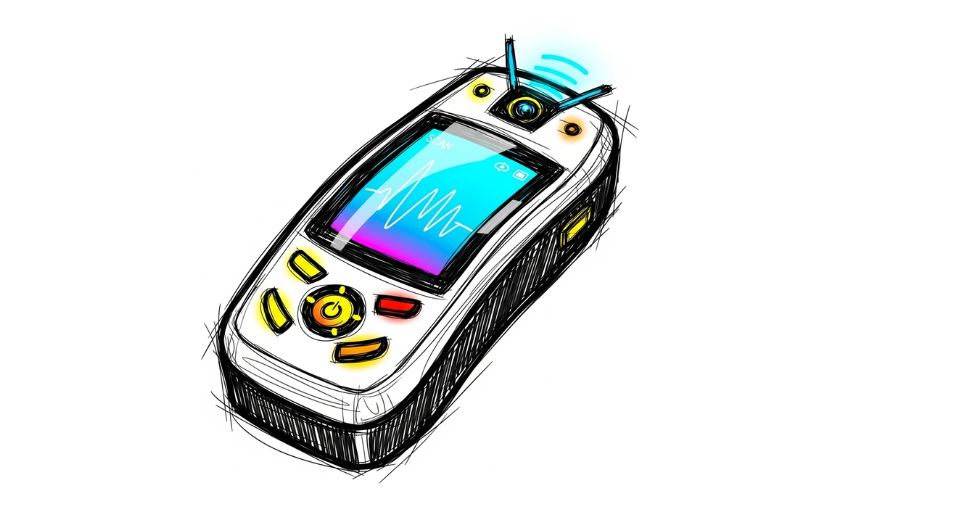
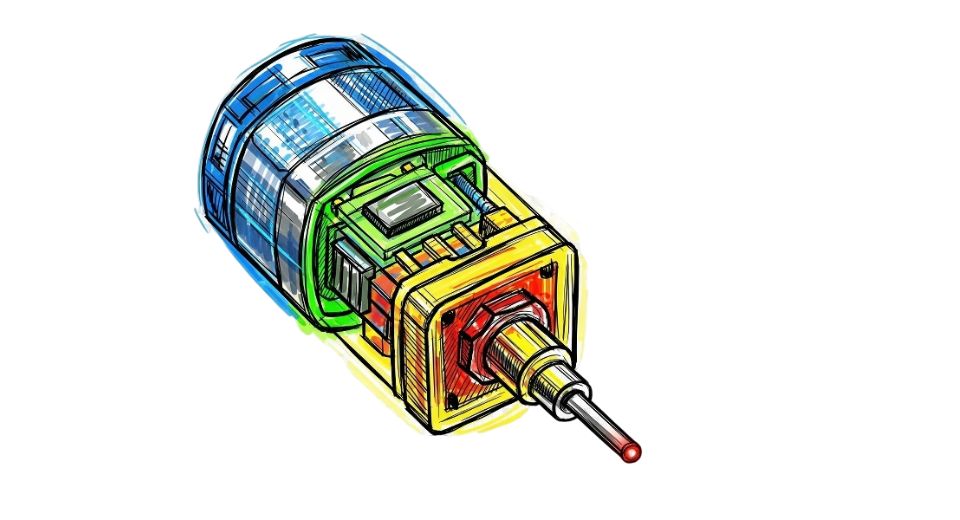
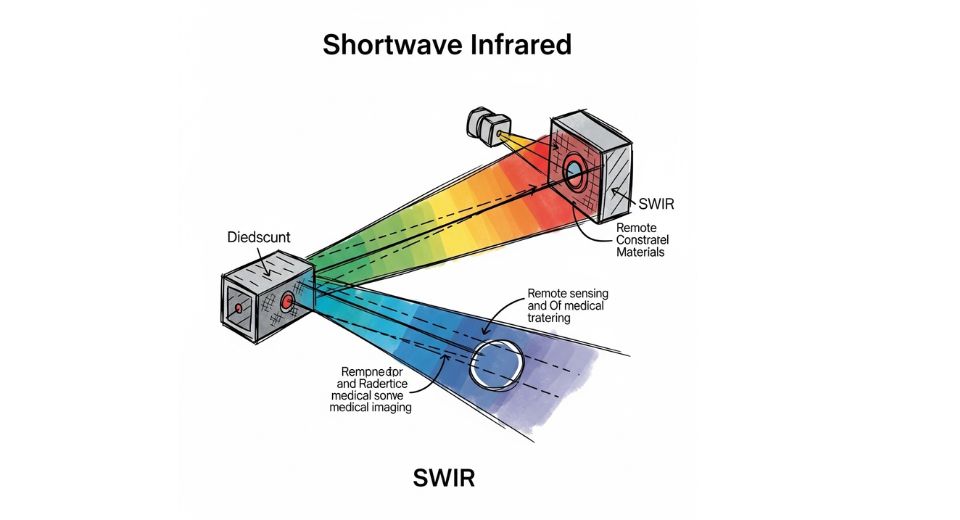

 US: +1 3023308252
US: +1 3023308252






